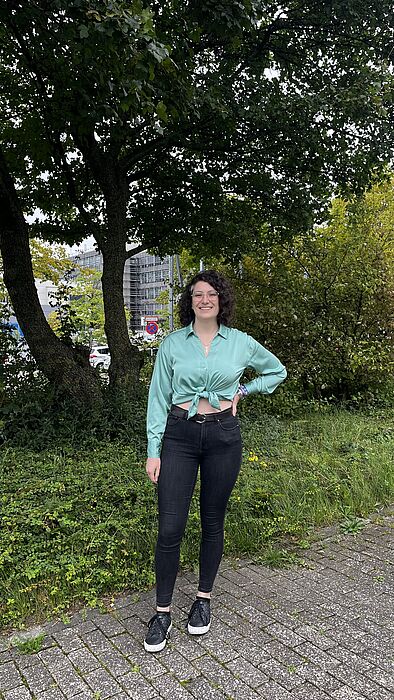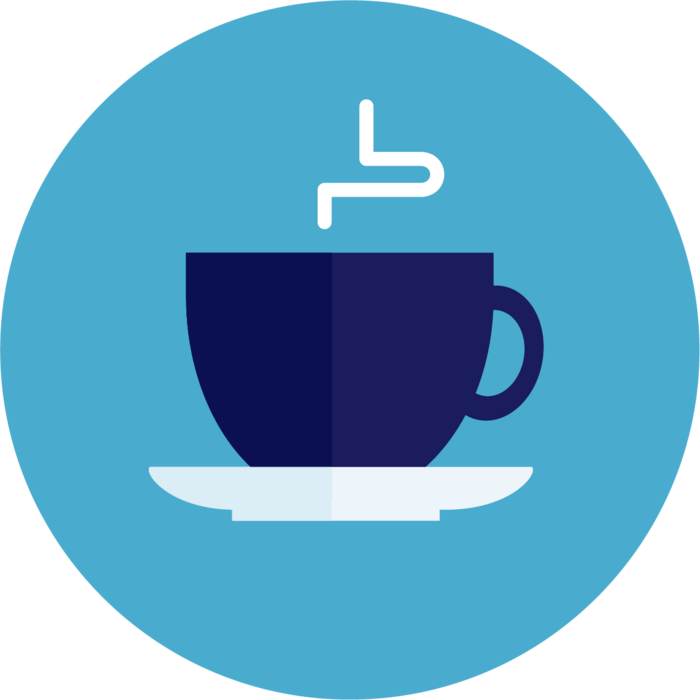From the programming internship to Florida
In this portrait, Alisa Stiballe tells us her impressions of the Computer Engineering combined degree program and about the various offerings and opportunities in the department.
Alisa Stiballe is 22 years old and is currently writing her bachelor's thesis in Computer Engineering. She started her studies in 2019, but she discovered her passion for computer science much earlier in her school days. The decision to choose the combined degree program was Alisa's at short notice "about 2 weeks before the semester started I saw that this degree program existed and I just found the description much more interesting than pure computer science because it is so directly applicable. For example, in the fields of autonomous driving or medical technology" she tells.
In the course of her bachelor's degree, Alisa found her area of expertise, which she would like to further deepen in her master's degree at the Paderborn University. This involves testing computer chips, which is a good combination of the two subjects. Alisa reports: "This is about logic circuitry, in principle you have heard that PCs calculate with 0s and 1s. This then means power or no power and that's what it's all about, before the computer chip is built it is simulated and tested to see if it works. This step is called validation, then when the chip is built it is tested again."
The Beginnings of Computer Engineering Studies
As with many other courses, Computer Engineering requires the basics to be taught at the beginning. These cover about 4 semesters, Alisa herself says that this can be a bit tiring and hard if you are not yet so aware of the overall meaning behind what is being taught. "However, it's really important to master the basics first so that you can then work properly." In the 5th and 6th semesters, elective courses then await you, in which you can devote yourself to your individual interests.
The foundation courses tend to take place together with the computer science or electrical engineering students. Accordingly, these are also large, but there is no reason to worry about drowning, because the student council, of which Alisa is also a member, is always there to support you in various ways during your studies.
For example, in addition to the regular tutorials offered by the departments, they also offer other practice opportunities in which, in contrast to the other offerings, the acute wishes of the students are individually addressed.
Unfortunately, Alisa's bachelor studies were also affected by the Corona pandemic, despite which she says she generally enjoys studying "in contrast to school days, where you were forced to do what the curriculum said, when you study you can mainly do what you feel like. Above all, you're allowed to work and learn as you see fit."
What Alisa also sees as a great advantage of Paderborn University is that it is a campus university, meaning everything is centrally located in one place. Secondly, she says, the Computer Engineering department is well staffed. This means that the students have a good relationship with the lecturers and vice versa. This has a positive effect on the support and guidance during the course of studies, since questions can be asked more easily "or it is easier to find someone who matches one's interests, especially in the elective area and when it comes to theses.
Working alongside your studies
Alisa Stiballe has decided to work as a student assistant in addition to her studies. For 2 years now she was active in the measurement technology and was allowed to realize projects there herself. Especially in terms of applications, she was able to gain experience "with the soldering of microcontrollers, which I then also used in my internship. That was very exciting because the hardware came first and I could still program afterwards, so I had insight into both sides." It is important to note that hardware is the physical part of a computer, while programming is the activity of creating software that controls the hardware and makes it perform tasks.
Offers from and for students
Alisa is also an active member of the Computer Engineering Student Council, where she passionately helps to organize and run various events at the university. The student council is also currently taking care of things like a support net, where institutions like the e-lab, the tutorials, the student advisory service, the PAUL office, the student council, the learning center and the Culture Fellow are combined. In the future, students of the Electrical Engineering Institute will be able to contact this office with problems or questions, and they will then be helped directly and referred to the appropriate institution.
Furthermore, Alisa reported about the E-Lab, which is basically open for all students of the Paderborn University, but especially for the students of electrical engineering. There you have the possibility to bring your own projects "be it something for soldering, for 3D printing or just ordering and repairing components."
Introductory courses in lab and measurement equipment are also offered there. "In the lab practical, unfortunately, you don't really get introduced, it's assumed that you already know that. That's where we offer to learn everything so that you can then get along well in the internship. Soon, small projects will be offered again. They will last a few hours in one day."
From the project to Florida
As a small motivation to decide to study, Alisa tells of a programming internship for which her group wrote and submitted a demo paper. "In this internship, we built an emergency communication system that would take hold if cellular and internet were to fail. That would be a different radio technology called Lora, which has mainly high ranges, it's a little slower, but you can just dial up your cell phone and chat.
Now she gets to fly to Florida in October to the IEEE LCN conference and present the project there "none of us would have thought that at the beginning."
5 tips for the start of your studies:
1. Attend the tutorials and exercises, including those offered by the student council.
2. Take advantage of the events outside of the daily study routine, there you have the perfect opportunity to get to know other people and make friends.
3. Form study groups, there you can help each other and are not alone in despair.
4. Take advantage of offers like the e-lab and its programs.
5. Don't give up at the beginning, even if it seems complicated at first. The effort is worth it, because in the end it will be really interesting.
______________________________________________________________________
The series "Have a coffee with..." gives you an insight into the study of computer science, in which students talk about their individual experiences. In order to show the diversity of studying computer science, we try to capture as many perspectives as possible and let you share in the experiences. If you would like to share your own experiences, please contact us - the PR team of the Institute of Computer Science.


